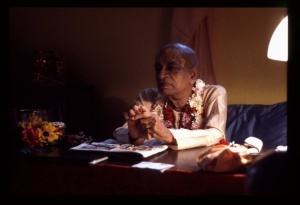CC Adi 5.13: Difference between revisions
m (1 revision(s)) |
No edit summary |
||
| Line 1: | Line 1: | ||
{{ | [[Category:Sri Caitanya-caritamrta - Adi-lila Chapter 05|C013]] | ||
<div style="float:left">'''[[Sri Caitanya-caritamrta|Śrī Caitanya-caritāmṛta]] - [[CC Adi|Ādi-līlā]] - [[CC Adi 5|Chapter 5: The Glories Of Lord Nityānanda Balarāma]]'''</div> | |||
<div style="float:right">[[File:Go-previous.png|link=CC Adi 5.12|Ādi-līlā 5.12]] '''[[CC Adi 5.12|Ādi-līlā 5.12]] - [[CC Adi 5.14|Ādi-līlā 5.14]]''' [[File:Go-next.png|link=CC Adi 5.14|Ādi-līlā 5.14]]</div> | |||
{{CompareVersions|CC|Adi 5.13|CC 1975|CC 1996}} | |||
{{RandomImage}} | |||
==== TEXT 13 ==== | ==== TEXT 13 ==== | ||
<div | <div class="verse"> | ||
māyātīte vyāpi-vaikuṇṭha-loke | :māyātīte vyāpi-vaikuṇṭha-loke | ||
pūrṇaiśvarye śrī-catur-vyūha-madhye | :pūrṇaiśvarye śrī-catur-vyūha-madhye | ||
rūpaṁ yasyodbhāti saṅkarṣaṇākhyaṁ | :rūpaṁ yasyodbhāti saṅkarṣaṇākhyaṁ | ||
taṁ śrī-nityānanda-rāmaṁ prapadye | :taṁ śrī-nityānanda-rāmaṁ prapadye | ||
</div> | </div> | ||
| Line 14: | Line 18: | ||
==== SYNONYMS ==== | ==== SYNONYMS ==== | ||
<div | <div class="synonyms"> | ||
māyā- | ''māyā-atīte''—beyond the material creation; ''vyāpi''—all-expanding; ''vaikuṇṭha-loke''—in Vaikuṇṭhaloka, the spiritual world; ''pūrṇa-aiśvarye''—endowed with full opulence; ''śrī-catuḥ-vyūha—madhye''—in the quadruple expansions (Vāsudeva, Saṅkarṣaṇa, Pradyumna and Aniruddha); ''rūpam''—form; ''yasya''—whose; ''udbhāti''—appears; ''saṅkarṣaṇa-ākhyam''—known as Saṅkarṣaṇa; ''tam''—to Him; ''śrī-nityānanda-rāmam''—to Lord Balarāma in the form of Lord Nityānanda; ''prapadye''—I surrender. | ||
| Line 23: | Line 27: | ||
==== TRANSLATION ==== | ==== TRANSLATION ==== | ||
<div | <div class="translation"> | ||
I surrender unto the lotus feet of Śrī Nityānanda Rāma, who is known as Saṅkarṣaṇa in the midst of the catur-vyūha [consisting of Vāsudeva, Saṅkarṣaṇa, Pradyumna and Aniruddha]. He possesses full opulences and resides in Vaikuṇṭhaloka, far beyond the material creation. | I surrender unto the lotus feet of Śrī Nityānanda Rāma, who is known as Saṅkarṣaṇa in the midst of the catur-vyūha [consisting of Vāsudeva, Saṅkarṣaṇa, Pradyumna and Aniruddha]. He possesses full opulences and resides in Vaikuṇṭhaloka, far beyond the material creation. | ||
</div> | </div> | ||
| Line 30: | Line 34: | ||
==== PURPORT ==== | ==== PURPORT ==== | ||
<div | <div class="purport"> | ||
This is a verse from Śrī Svarūpa Dāmodara Gosvāmī’s diary. It appears as the eighth of the first fourteen verses of Śrī Caitanya-caritāmṛta. | This is a verse from Śrī Svarūpa Dāmodara Gosvāmī’s diary. It appears as the eighth of the first fourteen verses of ''Śrī Caitanya-caritāmṛta''. | ||
</div> | </div> | ||
__NOTOC__ | |||
<div style="float:right; clear:both;">[[File:Go-previous.png|link=CC Adi 5.12|Ādi-līlā 5.12]] '''[[CC Adi 5.12|Ādi-līlā 5.12]] - [[CC Adi 5.14|Ādi-līlā 5.14]]''' [[File:Go-next.png|link=CC Adi 5.14|Ādi-līlā 5.14]]</div> | |||
__NOTOC__ | |||
__NOEDITSECTION__ | |||
Revision as of 18:15, 3 August 2021

A.C. Bhaktivedanta Swami Prabhupada
TEXT 13
- māyātīte vyāpi-vaikuṇṭha-loke
- pūrṇaiśvarye śrī-catur-vyūha-madhye
- rūpaṁ yasyodbhāti saṅkarṣaṇākhyaṁ
- taṁ śrī-nityānanda-rāmaṁ prapadye
SYNONYMS
māyā-atīte—beyond the material creation; vyāpi—all-expanding; vaikuṇṭha-loke—in Vaikuṇṭhaloka, the spiritual world; pūrṇa-aiśvarye—endowed with full opulence; śrī-catuḥ-vyūha—madhye—in the quadruple expansions (Vāsudeva, Saṅkarṣaṇa, Pradyumna and Aniruddha); rūpam—form; yasya—whose; udbhāti—appears; saṅkarṣaṇa-ākhyam—known as Saṅkarṣaṇa; tam—to Him; śrī-nityānanda-rāmam—to Lord Balarāma in the form of Lord Nityānanda; prapadye—I surrender.
TRANSLATION
I surrender unto the lotus feet of Śrī Nityānanda Rāma, who is known as Saṅkarṣaṇa in the midst of the catur-vyūha [consisting of Vāsudeva, Saṅkarṣaṇa, Pradyumna and Aniruddha]. He possesses full opulences and resides in Vaikuṇṭhaloka, far beyond the material creation.
PURPORT
This is a verse from Śrī Svarūpa Dāmodara Gosvāmī’s diary. It appears as the eighth of the first fourteen verses of Śrī Caitanya-caritāmṛta.